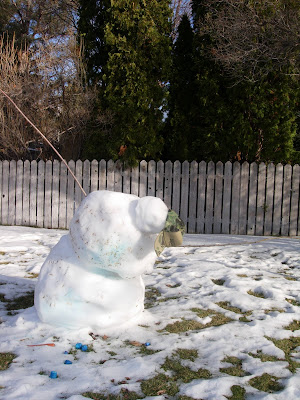(Quoted in Agnes de Mille, Dance to teh Piper Little, Brown, 1952, p. 256.) I read this in the book: Dear Genius by Leonard S. Marcus. They are the letters to authors and illustrators from Ursula Nordstrom. She "Could not resist the temptation to write." (introduction)She worked with E.B. White and Margaret Wise Brown and Shel Silverstein. Large book that I am perusing for good ideas, quotes.
Wednesday, December 30, 2009
Only one of You.
"There is a vitality, a life force, an energy, a quickening that is translated through you into action and because there is only one of you in all of time, this expression is unique. And if you block it, it will never exist through any other medium and it will be lost. It is not your business to determine how good it is, nor how valuable, nor how it compares with other expressions. It is your business to keep it yours clearly and directly, to keep the channel open."
(Quoted in Agnes de Mille, Dance to teh Piper Little, Brown, 1952, p. 256.) I read this in the book: Dear Genius by Leonard S. Marcus. They are the letters to authors and illustrators from Ursula Nordstrom. She "Could not resist the temptation to write." (introduction)She worked with E.B. White and Margaret Wise Brown and Shel Silverstein. Large book that I am perusing for good ideas, quotes.

(Quoted in Agnes de Mille, Dance to teh Piper Little, Brown, 1952, p. 256.) I read this in the book: Dear Genius by Leonard S. Marcus. They are the letters to authors and illustrators from Ursula Nordstrom. She "Could not resist the temptation to write." (introduction)She worked with E.B. White and Margaret Wise Brown and Shel Silverstein. Large book that I am perusing for good ideas, quotes.
Tuesday, December 29, 2009
Ruby Love Headbands
Friday, December 25, 2009
Santa's Flexible Schedule
Blocked Writer

Most writers deal with writer’s block; I deal with “block the writer”.
This form of blocking happens when the writer sits down at the computer and is immediately presumed to not be working, but noodling around on the computer; like a hobby to be put down at the drop of a hat, in order to do more important things; like cleaning the toilet.
“Amanda, that toilet could use a shining.” Dad will holler from the kitchen.
“I did, three days ago.” I callfrom the computer room. Now where was that train of thought going before I was derailed?
“Well, it needs it again.” He responds, equally annoyed that I would ignore his request.
My six year old son does have a problem with aim, so it isn’t a rash request.
This stymies me because he doesn’t struggle with his aim on the basketball court, in fact his form is quite good. But until he can master it on the home court, I head to the bathroom and shine it up.

Saturday, December 19, 2009
Once There Was A Snowman
Tuesday, December 15, 2009
Magical World

Instead of shoveling sidewalks J shoveled the lawn!

Calvin and Hobbes inspired snow forts.


Jaden came in from playing outside in the snow. He needed his hair dried, new socks, and a bath room break. And dry mittens.
As I put on his boots I noticed they were a little ripe. Better clean them. So tonight I piled the coat, two pairs of gloves, hat, scarf next to the heating vent. Stuffed newspaper in whatever I could to absorb the moisture. An idea Martha S inspired. .. Then I took the liners of his boots down stairs to the laundry. As the water fill the drum I read the tag inside on how to wash them. Found out they were made of Recyclable Polyester. Well no wonder I thought! That stuff lasts forever and they've recycled it.
Saturday, December 12, 2009
Merry Chrithmath!
Tuesday, December 8, 2009
Winter Book

The weather is perfect for reading the book: I Am David by Anne Holm. I included a book review below from readingmatters.com The bone cold outside has made me more able to picture David crawling around on a mountain side in a snow storm. I cup of cocoa at that point helps! But I am excited to see the movie too. Here in IF it is located at the library. enjoy.
This is a story about a young boy's epic journey across Europe, and his budding emotions and sense of the wonder of life.
The facts are simple. David is a 12 year old boy. He has lived all his life in a concentration camp somewhere in eastern Europe. He does not know anything about his parents or where he comes from, or why he is in the camp. All he knows is that he is David. One day, without any explanation, a guard arranges for him to escape. The electric current is switched off from the perimeter fence for half a minute, just long enough for David to climb over. He is given bread and water and a compass. He is told to head south for Salonica, stow away on a ship sailing to Italy, and then walk north until he comes to a country called Denmark. And that is what David does.
Now, what kind of person would you be if you had spent all your life in a concentration camp? The first thing you may notice about David is his extraordinary isolation. He has survived in the camp by never allowing himself to think further than the next meal. After the death of his friend and teacher, Johannes, he never permits himself to have any affection for anyone. Out of the camp and on the run he believes, not unreasonably, that 'they' are after him. Of all the people that he meets on his long journey, he doesn't feel able to trust anyone. And so he shoulders the burden of the journey alone. Consequently, of course, all the judgments he makes about other people and their actions, and his own actions, are governed entirely by his own moral standards.
He has very high moral standards. For instance, he refuses to accept payment for a small service that he renders voluntarily to a stranger. For him, I think, to chose to observe high moral standards is a symbol of his new-found liberty. And should anyone fall below his own exacting standards he is an unforgiving opponent:
Haven't you seen that David hates Carlo? Not like boys who fight and then forget about it because there is really nothing serious to fight over. David hates Carlo as a grown man hates. He talks to him only when he has to, and then he speaks politely and coldly and refuses to look at him.
But as David journeys across Europe he begins to comprehend that he cannot live life entirely alone. He does need other people, Maria, whom he saves from the fire, and the dog, and perhaps a mother of his own ... And it works the other way round - other people may need things from him. It is not good enough for David simply to hate evil when he finds it in others. If others say they are sorry for their evil acts then he must also learn to forgive, because relentless unforgiving is another kind of cruelty.
The book is not set in a real time or place. Although the circumstances seem real enough, David's background is a synthesis of all the terrible persecution that happened during the Second World War and the subsequent years of cold war communism. This helps to make David a very powerful and pure figure. I don't think he is particularly real. Anne Holm uses him as a blank canvas on which can be drawn the first experiences of life - beauty, knowledge, trust, religion, love, everything.
And what pleasure he discovers in the simple things of life:
Before he had come to the town he had known about nothing but death: here he had learnt to live, to decide things for himself; he had learnt what it felt like to wash in clean water in the sunshine until he was clean himself, and what it felt like to satisfy his hunger with food that tasted good; he had learnt the sound of laughter that was free from cruelty; he had learnt the meaning of beauty -
More of a discussion paper than an adventure story, but atmospheric and quite thought-provoking. If you want to know whether David eventually finds a place to settle down, you will have to read the book.
Read the background article About I Am David

Subscribe to:
Comments (Atom)
















